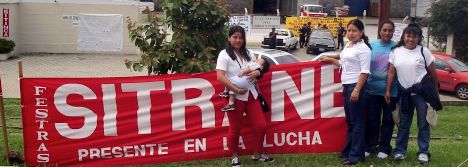The globalisation process is characterized by a worldwide organization of production carried out by large private corporations, by financial globalisation and by economic interdependency. Increasing worldwide competitiveness is forcing countries to open up their inner markets through Free Trade Agreements achieved in negotiations between governments, large companies and the business sector. Social organizations of the civil societies concerned are left out of important decisions. Amnesty International point out in a report that 'as human rights defenders [across the Americas] consolidate efforts and form new alliances to address complex human rights problems related to free trade agreements, the activities of private sector companies and global economic policies, they are increasingly at risk of human rights violations'1 particularly in the form of aggression and intimidation. The communities that reject the Free Trade Agreements (PPP, FTAA, CAFTA, etc.) and the organizations that relay their protests are increasingly targeted by a new wave of repression.
Local and regional effects of globalisation on the respect of human rights.
PBI will continue to investigate the consequences of such macroeconomic policies on human rights in Guatemala. This requires to carry out field work and to travel to different areas. Priority areas have been selected based on:
- Ability to combine field work with other priority processes of the team, for questions of human resources.
- Departments that are most affected by globalisation policies. Departments in which PBI has worked or plans to start working.
The following departments were prioritized:
- Quiché (with a special focus on the Ixíl area)
- San Marcos
- Petén
- Izabal
- Sololá
- The Verapaces.
Protection of the environment.
Experts estimate that Guatemala has lost 50% of its woodland compared to 19502 13% of its known floral species are threatened3 and it is estimated that 75% of surface water is contaminated.4 One of the areas of work that have started in 2004 is the accompaniment of persons threatened by their work in defense of the environment and against mining and its consequences. That sector is one of the most threatened and harassed by a quantity of economic interests. In 2004, the team has offered protective accompaniment to the Colectivo Madre Selva and to Eloyda Mejía Samayoa, legal representative of the Association of the Friends of Lake Izabal
- Amnesty International. Index AMR 01/009/2003 web.amnesty.org/library/index/ENGAMR010092003)
- Perfil Ambiental de Guatemala, 2004, Universidad de Rafael Landvar, p. 89.
- Ibid, p. 129.
- Madre Selva Collective, 2002, p. 16.

